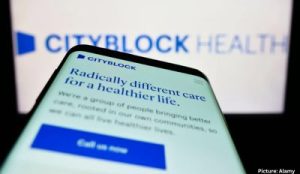In the various permanent establishments of Cityblock Health scattered throughout the mid-Atlantic and Midwest regions of the United States, one can find sleek waiting areas adorned with a royal-blue theme, mirroring the company’s branding. Additionally, in certain cities, the company employs mobile units, large motor caravans retrofitted for medical purposes and painted in the same distinctive hue. Originally conceived as part of Sidewalk Labs, Google’s Urban Innovation division, Cityblock Health aims to enhance accessibility in healthcare by providing medical, mental health, and social services. Its aesthetic resonates with the polished ambiance often associated with Silicon Valley startups, resembling a trendy urban coffee shop.
Cityblock Health is just one of the many startups, both physical and digital, that have emerged within the American healthcare landscape, striving to revolutionize the sector. These ventures aspire to replace the conventional, sterile, and often labyrinthine healthcare systems with something more welcoming and efficient, occasionally even resembling a spa-like experience. While similar initiatives are emerging globally, the United States presents a unique opportunity due to the complexity and opacity of its private insurance system.
These companies endeavor to tackle some of the fundamental challenges in the American healthcare domain, primarily revolving around cost and accessibility. They streamline appointment scheduling, reduce waiting times to see healthcare professionals, and facilitate access to previously restricted medical technologies. Moreover, many of these entities engage directly with private and government insurers, simplifying administrative processes for patients as an integral component of their business strategies.
In adopting this approach, these startups not only aim to dismantle barriers within the healthcare sector but also seek to attract a new, younger demographic of consumers through familiar and frictionless experiences. The success of such endeavors remains to be seen.
The Healthcare Market Landscape
Many of these emerging healthcare players boast physical establishments characterized by curated, minimalist designs across various areas of healthcare provision. Dental franchise Tend operatesnumerous storefronts across the United States, all featuring warm wood accents and cool green tiling. Utilizing an app for appointment scheduling, Tend emphasizes transparent pricing and offers amenities such as noise-canceling headphones for patients to enjoy television during treatments. Furthermore, they feature “The Brushery,” a designated area designed for capturing “selfie moments,” according to Tend. One Medical, a membership-based chain of urgent-care centers, prioritizes same-day appointments and hosts an on-site laboratory. In February 2023, Amazon finalized an all-cash acquisition of the chain for $3.9 billion, subsequently introducing discounted memberships for Prime subscribers at an annual rate of $99 in November.
Virtual startups, guided by similar principles, play a significant role in the healthcare landscape. These digital platforms echo the minimalist aesthetics of brick-and-mortar clinics while offering services through modern, highly functional web interfaces. Maven Clinic, a virtual women’s healthcare platform, earned recognition as one of Time magazine’s 100 Most Influential Companies of 2023. Meanwhile, BetterHelp, connecting patients directly with mental health professionals online, surpassed $1 billion in profits in 2022.
Additionally, certain companies aim to deliver healthcare hardware directly to consumers’ homes. TytoCare markets a thermometer-otoscope-stethoscope device branded as a “smart clinic,” available for purchase at national retailer Best Buy. Mosie Baby offers an at-home insemination kit priced at $129 and recently obtained approval from the US Food and Drug Administration (FDA).

According to Dan D’Orazio, CEO of healthcare research and consulting firm Sage Growth Partners, the surge in privately-funded healthcare startups can be attributed to the substantial scale of healthcare spending in the United States. D’Orazio highlights that if US healthcare were treated as an independent entity, its GDP would amount to $4.3 trillion, ranking it as the fourth-largest in the world. This vast financial landscape presents fertile ground for innovation and potential profit.
Addressing Pain Points in Healthcare
Helen Zhang, head of communications at Tend, acknowledges the widespread aversion to dental visits. She notes that not only do customers often rate the experience poorly on metrics such as the net promoter score, but dental visits are also associated with surprise bills, lengthy wait times, judgmental attitudes from clinicians, and unwelcoming environments. Zhang emphasizes Tend’s mission to eliminate these deterrents, aiming to create a dental visit experience so comfortable and inviting that patients perceive it as a joyful occasion, thereby encouraging regular attendance and prioritization of oral health.
Optimal Timing
The proliferation of healthcare startups, particularly in the realm of virtual health services, owes much to timing. While many of these companies had been in existence since the 2010s or earlier, the exponential growth in telehealth utilization during the pandemic accelerated consumer acceptance and demand for digital services.
Dan D’Orazio underscores the significance of this shift, noting that prior to COVID-19, telemedicine adoption rates stood at around 2 to 3%. The pandemic catalyzed a transformation in attitudes toward virtual care, condensing what would have taken years into a matter of weeks. This newfound openness to telehealth facilitated the expansion of medical technology startups, including physical franchises offering specialized services in aesthetically appealing environments. While catering to patients of all ages, younger generations have been particularly receptive to these innovations.
A Path Forward?
While the proliferation of startups has undoubtedly improved accessibility to primary and specialist care, Dan D’Orazio cautions against equating these achievements with overall success and sustainability. Numerous health tech startups, especially those reliant on private investment, have faltered, with notable examples including Theranos, founded by Elizabeth Holmes, which was exposed as fraudulent. Other ventures, like Smile Direct Club, have faced abrupt closures, leaving customers in uncertain situations.
D’Orazio attributes the challenges faced by many startups to a fundamental misalignment between their identity as tech companies and the complexities of the healthcare industry. He stresses the importance of collaboration between traditional medical establishments and startup ventures, emphasizing the need for integration to navigate regulatory hurdles and workforce shortages effectively.
While the emergence of startups heralds a potential shift in the landscape of American healthcare, it is unlikely to supplant traditional models entirely. However, these innovative ventures may serve as catalysts for incremental changes within the broader healthcare system.
